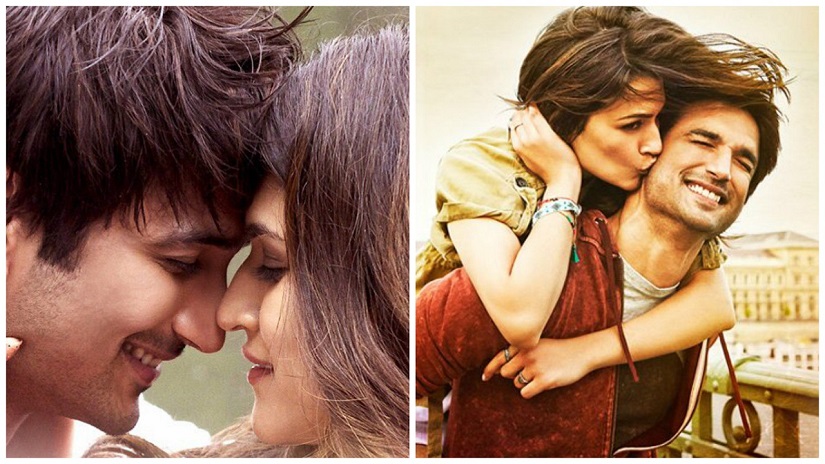By Shritan Varma
There’s a moment earlier on in this abomination, when Sushant Singh Rajput quips, “Kya hai yeh? Nahi yaar yeh hai kya?! Where is the ambience? Where is the moon? Where is the ROMANCE?”
That line ironically sums up the biggest problems of the film. Raabta is a reincarnation-themed love ‘saga’ which is iniquitously rendered soulless by hammy performances, a plodding narrative and the volatility of its tone.
Our YA fiction-esque love triangle begins in Budapest, where ‘crowd-puller’ Shiv and ‘Patakha’ Saira (notice how every Bollywood NRI girl’s name these days ends with ‘aira’?) fall in love with each other. He’s a banker and she’s a chocolatier (not the Willy Wonka kind). Now this is when the film is fairly watchable. It exhibits traces of passion and breeziness whenever Rajput and Sanon snuggle up on-screen in a couple of lovey-dovey musical montages with scenic backdrops, but unfortunately that’s just about it. Everything else is an unendurable farce. Even the central romance lacks spark and is mostly one-note fare. You don’t feel warmth or cozyness when the two are together and neither do you feel fretful when they’re apart or when the distressed damsel languishes on the antagonist’s private island.
Sanon surprisingly gets a bigger role here, but there isn’t much to her character. She isn’t likeable either, as Saira displays a tendency at various points throughout the film to cheat on her lover and her relationship with the two prominent men in the film is on-and-off to an aggravating degree. Sushant Singh Rajput shows promise when he’s wisecracking, but his deplorable comic-timing and ostentatious characterisation constantly punctures the screenplay and ruins the potential investment you could have had in a climacteric scene. Both these competent artists (yes, even Ms. Sanon; she was a revelation in her debut film) seem to bask under the mediocrity of their own film, and seem to be playing themselves. Smug Bollywood-ized youths who recite old Hindi love proverbs to fill the huge potholes in their otherwise emotionally hollow romantic fling, are never compelling characters and B-Town should have learnt this last year (*cough* Befikre *cough*).
Both the film and the two leads’ sugar-coated liason experience a massive consequential set-back when Shiv departs for a week and Jim Sarbh’s Zakir enters the scene. The unconventional rising star of Neerja and A Death In The Gunj, who was also the film’s primary draw for indie film lovers is outrageously wasted here. He delivers lines like a spoiled NRI child in a school assembly skit as if he were reading Hindi lines from a teleprompter (with a mixed Indian-foreign accent of course), constantly breaking up his sentences to flaunt Zakir’s fury. The awkward dialogue that the film presents when Sarbh flirts with Sanon make you shrink back in your seat and give your brain a reality check. As Saira rightly says, the man is damn ‘Ajeeb’. There’s a line which goes like- “meri line maarke mujhpe hi line maar rahe ho?”, which made me turn to the random stranger sitting next to me. The young woman (who seemed like she was still in her twenties — which is the film’s target demographic) took a long look at the tiled ceiling and tutted in disapproval.
What this film desperately needed was a ludicrous henchmen-killing, moustache-twirling baddie, to make it at least campy and rib-tickling during some temper tantrums. Instead, the film takes more time to convince everyone that Sarbh is a decent business tycoon and gentleman. As a matter of fact, even SSR gets to show off more negative shades when he occasionally shifts gears into total prick mode.
Before you know it, the film makes a sharp blast to the past, and now it’s hard not to draw parallels between the film and Rajamouli’s ‘Magadheera’ (another reincarnation saga). Much like in that film, you get a comet that cameos every few hundred years and an underrated actor disguised as a centuries-old soothsayer. Also, like Ram Charan, Sushant makes another entry through a waterfall except with CGI and rope-work nowhere as seamless as in a film made almost nine years ago. The colour scheme and locations in this flashback sequence are reminiscent of Ratnam’s ‘Raavan’ (which also has the same plot structure: woman falls in love with the bad guy, who is really the good guy, and no longer pines for her destined lover, who is technically supposed to be the good guy. ‘Voila’! Pure undying love). Kriti Sanon and the entire film crew should be commended for keeping a straight face, whenever Dothraki cosplayer Rajput tried to act while sounding like a grunting grizzly, gargling nuts and bolts. He gives unnecessarily long stares and constantly tilts his head to uphold the barbaric nature of his character, instead of attempting to giving effervescence and liveliness to the role. His pineapple/waffle hairdo provides a good distraction from the insipid story narration though.
After all this hellish witchcraft, which seems so intricately designed to put the audience to sleep, Deepika reprieves us with a dance number for a short while, but the damage is already done. The whole film ultimately adds up to nothing, as it provides no pay-off in a slapdash climax. It plays out exactly how you knew it would with not even a classic ‘good vs evil’ fist-fight in the name of conflict. In the end, Dinesh Vijan proves that he has no surprises up his sleeve. He never attempts to amp-up the scale and raise the stakes for the characters. It’s direct-to-video material, that you can tune into anytime and still not miss anything at all. If you’ve seen it already, you should’ve left as soon as the film threw its ‘Poorna Janam’ mumbo jumbo at your face.







Leave A Comment
You must be logged in to post a comment.